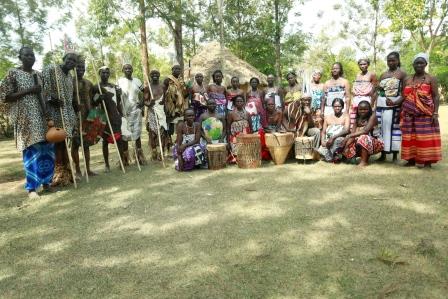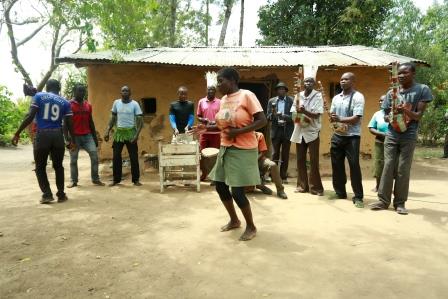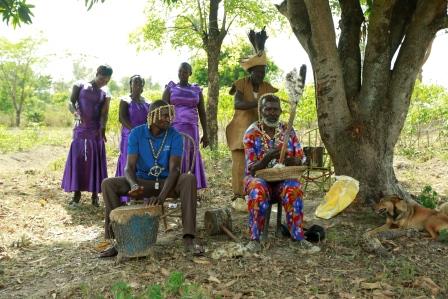Sunday, February 18th, 2018: This day is all about the Iteso people and their music. The Iteso are a smaller ethnic community in Kenya but has very distinctive music. In Uganda, they are more Iteso, located in Soroti. Its language is Ateso. The Iteso are Nilotics, one of the people of the Nile.
We drove to the town of Adungosi to record the Omong’oluk Traditional Dancers.

The current leader is Ibriam Aduomg Omong’oluk, the grandson of the founder of the dance group, Longinos Omong’oluk who started the group in the early 1990s. He died in 1998 at 87 years old. We first talked to Ibriam about the instruments and costumes used by the group; these included:
- Atenus: The bass drum
- Igelu: Shakers
- Akwara: Sticks
- Isiman: Jingles worn around the ankles
- Etwoo: A gourd that you blow into for a ‘bass’ beat.
The dancers wore “Emukule”, skins of cows and more rarely, Cheetahs. One of the dancers wore a “Amugwar”, a head piece made up of antelope horns.
We then talked to Ibriam about the songs (each of which is linked to the you tube video) we were recording; they were:
- Omuian’gi: A song about ‘in-laws’, where the in-laws are always complaining about the cooking of the daughter in law. They are never satisfied.
- Imadede: The name of a man with horrible manners. He gossips. He poisons neighbours if he is jealous of their success. In the song, the performers ‘call him out’, letting the whole village know this is a man of bad character.
- Achaung Kakolong: This is a song sung during droughts. Everyone in the village is running out of vegetables, and in the song the performers ask the villages to look for vegetables along the river banks. They need find wild vegetables wherever they can. We asked him about the type of vegetables they can find and they include “Erenge” (dark greens) and “Amudokolo” (vines). During the drought, all the women do what they can to feed the village with their finds.
- Iikadete Kamairo: This is a song about a small animal that hangs around the village and steals all the seeds that have been planted at the beginning of the season. The villagers only know that he’s been at his evil work when the rains come and none of the plants are growing.
- Koyeneetau Kauno: The title literally means “to tie up with rope your heart.” It is a wonderful song that is sung during an engagement of a young couple. It warns that couple that marriage is hard and you will leave your village and loved ones. But it also asks the village people to support the young couple and help them have a good marriage. Figuratively, we all need to hold to love and keep everyone close to your heart.
- Magic moment: Percussion and the Etwoo: Our final song for the day was a ‘Magic Moment’ where we captured the groove of the percussion and the Etwoo.
From Adungosi, we travelled to Obekai, to record the South Teso Jazz group. The group started in 1938 by Charles Olado. It is currently led by Patrick Okodoi.

We walked through all the band’s instruments first; these are:
- The Adeudeu: The Six Stringed Bass, that is big enough for bass player and a percussionist who sits on back to play the ‘kick’ drum. You then have the 9 string ‘rhythm instrument, the Seketa and the 9 String ‘Solo’.
- Percussion includes: The ‘drum set’ of drums, bottle tops for snares and a plate serving as ride. The set is called the Achaeket. The shakers are called the Itwol. The ring is called the Edongot. Between their core songs, influences and a magic moment, we had a long session with the group.
Songs included:
- Ataikatiaka Kitiso: This song is about the unity of the Teso people. While forces are trying to divide the people, the song encourages everyone to stay united.
- Akidai Imojong: This song asked everyone to take care of old people and respect them.
- Asorit: This is a song about poison and refers specifically to Aids, which is the killing disease. The song tries to educate people to be cautious.
- Magic Moment: While playing, a young child Otwoma was dancing on the edge of the performance. He loved the music, so we brought him for a starring role. He stole the stage. He danced to a short reprise of Asorit.
- Akitogogong Akisisha: This song is about supporting education in Teso Land.
- Iyalama Imojong: This is a thank you song, in particular to the elders.
- Magic Moment: We then had a second Magic Moment where we just recorded the percussion.
- Wango: We then brought on Fadhilee, our 2018 Influences Artist, to play with the band. They played his song, Wango.
Let’s take a second to introduce Fadhilee now. His full name is Fadhilee Itulya. He was born in 1988 in Kakamega, western Kenya, but raised in Nairobi. In his words, Fadhilee’s dream is to “unveil the authentic Kenyan sound that will be a bridge between what has been there and what is going to come”. His love affair with the guitar started with the three chords he was taught by his mother on her guitar. From there he advanced on his own, becoming a nuisance in their house in Saika Estate in Nairobi’s Eastlands. His father didn’t find the guitar-plucking amusing, especially when he wanted to listen to the news on radio.
After high school he worked as a construction worker to fend for himself. Meanwhile he mastered his guitar, volunteering to teach kids music at the neighbouring Soweto slums. He continued offering private guitar lessons even after joining the University of Nairobi, where he is studying International Relations and Diplomacy. His first break in professional music was at the 2008 edition of Spotlight on Kenyan Music, where he represented Nairobi with his song ‘Jawabu’, which features on the compilation album. Other than the guitar he also plays the drums and the chivoti. We welcome Fadhilee to Singing Wells and hope you enjoy his contributions!
From Obekai, we drove to Kodedema, to record Obasie Palnyang.

The group was founded in 1958 by Obasie’s grandfather, Okomo. Obasie plays several instruments, including the Accordian, the Adeudeu and the single string instrument, the Eggereger (similar to the Orutu, but a deeper body). The drums are called ‘Atenus’. In addition the percussionist, Obasie is accompanied by a Etwo Aporutu player (gourd and pipe, or ‘Arupepe’). We recorded 8 songs, featuring each of the instruments.
Obasie played three songs with the Adeudeu (his 5 stringed instrument):
- Ema Mait Emoit: A song praising everyone that is not part of this community. He sang of East African countries and different ethic communities, welcoming them all
- Elolo Idalo: A song about praising someone who is doing well.
- Abalang’a Kimusa: A song about a salt shortage from years back, when they learned to burn certain plants to create salt taste from the ashes.
Obasie switched to the Ageregere and played three songs:
He then switched to the accordion and played three songs:
- Akidaun Ipejok Ore: A song welcoming visitors to the home.
- O’enera:
- Alomuni Kitsese Ko Djibouti: A song about the country you came from.
Given that we are linking everything to the actual performances, the less words the better – enjoy the music and dance. And with that, we packed up and drove to Busia.
